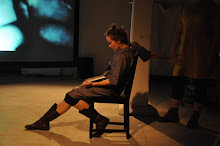Morton Feldman (1926-1987): The King of Denmark (1964) for solo percussion
Anton Webern (1883-1945): Konzert op.24 (1934) for nine instruments
Iannis Xenakis (1922-2001): Jalons (1986) for chamber orchestra
John Cage (1912-1992): Imaginary Landscape No. 4 (1951) for 24 performers and 12 radios
Feldman: For Samuel Beckett (1987) for chamber orchestra
The obvious crowd-pleaser in the group is the Cage piece, which I imagine made most of last night's audience feel nostalgic, but which will never go out of style, because doing low-brow things in high-brow spaces will always be funny. Think of the Marx Brothers. The Cage piece makes high art out of channel surfing. Any number of pairs of musicians stand on stage, and each pair shares a little ham radio (last night there were about 10). One musician is in charge of the channel dial, and the other the volume dial. The fun part is that all of this randomness (the fact that you can never know whether your radio is about to blare out Third Eye Blind or Verdi) is exactingly controlled by the prescribed length of time allotted for each outburst (we hear exactly one and a half bars of "Stairway to Heaven" followed by one beat of deafening silence). So it's at once a fancy, serious new music piece ... and it's also pretty goofy.Speaking of music and goofy, some degree of ink has been spilled in musicology over the question of what constitutes humor in music and why we find music funny at all, when we do. The age old example is Haydn's "Joke" quartet, where the composer endears the audience by toying with the impulse to clap at the end of a piece. He stops. And we start to clap. And then he starts again. It's funny because Haydn calls our bluff. "The rests get progressively longer, giving the impression that the piece is over many times in a row, making for an amusing ending." Um, thanks, Wikipedia!
But then come Xenakis's Jalons, during which I several times last night had to smother my own laughter with a laugh-cough (which is definitely not a laugh, but only a cough that briefly -- whoops! -- sounds like a laugh). Xenakis is a genius of the musical joke and Jalons a litany of every possibility for extracting humor out of variations in volume, rhythm, and audience expectation.
Favorite moment on the program: Steve Schick's extremely sexy rendition of Feldman's King of Denmark. If you thought Feldman wasn't sexy, think again.




No comments:
Post a Comment